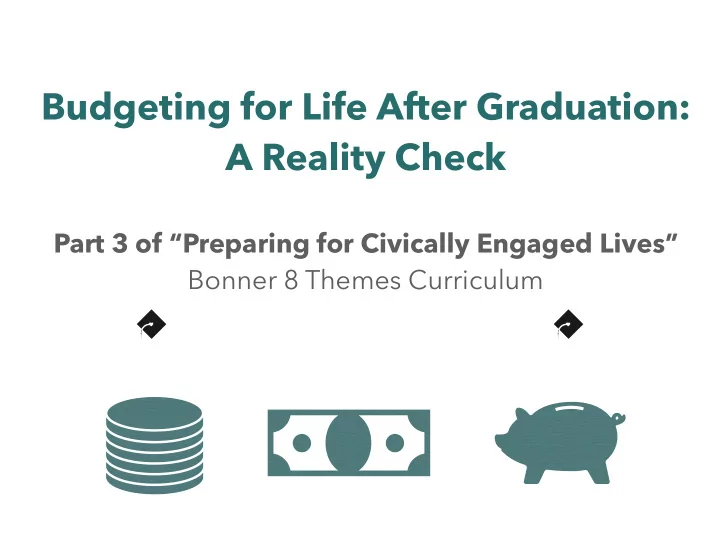

Budgeting for Life After Graduation: A Reality Check Part 3 of “Preparing for Civically Engaged Lives” Bonner 8 Themes Curriculum
After This Workshop ⦿ You will be able to: • Understand an average monthly budget breakdown • Practice tips for managing your money AFTER college • Establish a savings habit
Budget Breakdown ⦿ Average Monthly Living Expenses: Housing 30% Transportation 18% Debt 10% Food 14% Household 7% Savings 10% Everything else 11% Source: Department of Labor, Bureau of Statistics
Maria’s Budget Breakdown ⦿ Total Monthly Take-Home Pay: $4,000 Housing 30% Transportation 18% Debt 10% Food 14% Household 7% Savings 10% Everything else 11% Here is a good source to calculate expenses: https://www.taxformcalculator.com/
Dan’s Budget Breakdown ⦿ Total Monthly Take-Home Pay: $2,500 Housing 30% Transportation 18% Debt 10% Food 14% Household 7% Savings 10% Everything else 11%
Managing Money After College ⦿ Repaying student loans ⦿ Plugging spending leaks ⦿ Managing debt ⦿ Stretching a dollar
Financial Aid: Borrowing Tips ⦿ The less you borrow, the less you have to repay ⦿ Calculate repayment amounts BEFORE you borrow ⦿ Total student loan debt should be less than starting annual salary after graduation ⦿ Use loans only for educational expenses, not food, clothes, gas
Plugging Spending Leaks ⦿ Leave your your debit/credit card at home ⦿ Attend free campus concerts and plays ⦿ Use your bike or public transportation ⦿ Carry a refillable water bottle instead of purchasing soft drinks or coffee drinks ⦿ Limit the number of songs, ringtones, etc., you download USE A SPENDING DIARY
Your Spending Diary ⦿ Date ⦿ Item ⦿ Amount ⦿ Look back to see what the most common categories were in your spending and how much you spent in each category.
Credit Card Strategies ⦿ Limit use to one card ⦿ Define “emergency use” ⦿ Understand credit terms ⦿ Pay more than the minimum
Debt Repayment Total Cost Credit Card Interest Rate Monthly Months to Pay Years to Pay (Balance + Balance (%) Charged Payment Off Balance Off Balance Interest) $40 $2,000 18% 90 7.5 $3,608 minimum $2,000 18% $50 60 5.0 $3,004 $2,000 18% $150 15 1.3 $2,211 *1 *$2,000 0% $2,000 Next Credit 0 $2,000 Card Statement *If you pay off the full amount of the credit card balance every month, no interest will be charged.
One Debt at a Time ⦿ Debt Recovery Worksheet Amount Monthly Due Amount Date Paid Owed Payment Date Paid Amount owed • Monthly Payment • Due Date • Amount Paid • Date Paid •
Making Your Money Go Further ⦿ Avoid buying sodas and snack out of vending machines ⦿ Kick a costly habit (cigarettes, lattes) ⦿ Use the library ⦿ Use the internet for comparison shopping
Savings & Investing Strategies ⦿ Practice self-discipline ⦿ Make savings a fixed expense ⦿ Set realistic goals ⦿ Delay gratification ⦿ Increase your investment knowledge
Tips for Paying Your First ⦿ Automatic Transfer ⦿ Payroll Deduction ⦿ Loose Change Jar ⦿ Goal Envelope ⦿ Write Yourself a Check
Retirement: Who Cares? ⦿ Reality Check • The earlier you begin to plan for and save for retirement, the better prepared financially you will be. • Economic Principle: Time Value of Money
What a Difference a Few Years Make? Jorge’s IRA Olivia’s IRA Interest rate 9% 9% Years contributions 9 years (age 22 to age 31) 34 years (age 31-65) were made Amount contributed $1,000 per year $1,000 per year For 9 years = $9,000 For 34 years = $34,000 Value of IRA at age 65 $13,021 at age 31; this lump sum At age 65 equals: $196,982 then compounds: At age 65 equals: $243,863
Budgeting for Life After College ⦿ Expenses & Monthly Amount • Pay yourself First • Housing • Insurances • Credit Cards • Loans (Student & Other) • Etc.
Recap ⦿ Understand an average monthly budget breakdown ⦿ Practice tips for managing your money AFTER college ⦿ Establish a savings habit
Now What? ⦿ Research careers that match your interest and your desired income ⦿ Borrow wisely for your education ⦿ Use credit only if you can afford to pay it back quickly ⦿ Start saving and investing ⦿ Create a budget for life after college
Recommend
More recommend